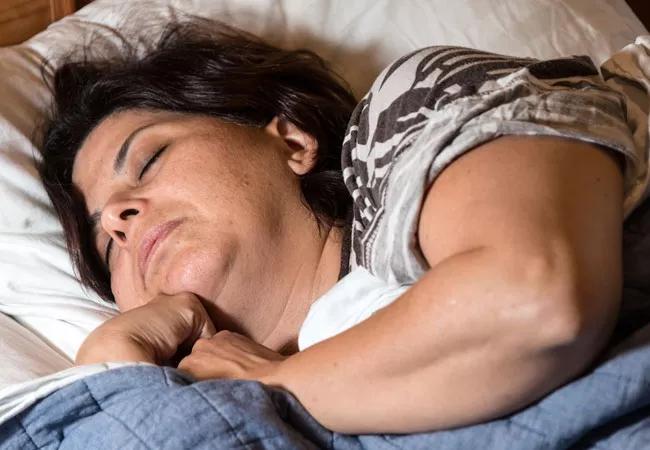Greater weight means less sleep, lower quality of life

For patients with stage I endometrial cancer who are severely or morbidly obese, poor sleep may be a particular problem and can lead to higher levels of depression and lower quality of life, according to a new study. The recently published study by Cleveland Clinic researchers reveals a connection between obesity and sleep quality in some women with endometrial cancer.
Advertisement
Cleveland Clinic is a non-profit academic medical center. Advertising on our site helps support our mission. We do not endorse non-Cleveland Clinic products or services. Policy
Incidence of and mortality from uterine cancer in the United States — the fourth leading cancer in women — are increasing. Ninety-five percent of uterine cancers are endometrial and women with a body mass index (BMI) ≥ 30.0 kg/m2 have a 1.7- to 4.5-fold higher risk of developing the disease than those with normal BMI.
Sleep disorders are common in cancer survivors, but little is known about the problem in women with endometrial cancer. In that population, Case Western Reserve University and Cleveland Clinic researchers hypothesized that sleep quality would be poorer, depression increased and quality of life reduced in endometrial cancer survivors with obesity. The results of their study, based on analysis of data from women seeking weight loss who were enrolled in the “REWARD” trial, were published in September in Supportive Care in Cancer.
“This was an observational study using baseline data from ‘REWARD’,” says senior author Jay Alberts, PhD, Vice Chair of Innovation within the Neurological Institute. “The take-home message for clinicians is the need for multidisciplinary evaluation and treatment of these patients, which can help target effective interventions that can address sleep and may improve cognitive function as a byproduct.”
“REWARD” is a lifestyle intervention conducted at the Case Comprehensive Cancer Center institutions in 120 women who are obese and have endometrial cancer. For the first time, researchers are evaluating whether “assisted” exercise, coupled with a group dietary behavioral program, can help patients lose weight at the end of cancer treatment.
Advertisement
Patients doing “assisted” exercise use a stationary exercise bike with a motor that helps them maintain a pedaling rate 35% greater than their voluntary rate. Data from “REWARD” are currently being analyzed and if the intervention proves successful, it could be easily adapted for use in obese individuals with and without cancer to improve sustained weight loss, quality of life and overall survival. One hundred women enrolled in “REWARD” were included in the study of sleep, quality of life and depression. All had stage I endometrial cancer. The average age of participants was 60 years. Mean BMI was 42.1 kg/m2 .
Researchers used the Pittsburgh Sleep Quality Index (PSQI) to measure seven components of participants’ sleep, from subjective sleep quality to daytime dysfunction. Depression was assessed using the 21-item Beck Depression Inventory-II. The Functional Assessment of Cancer Therapy—General (FACT-G) was used to measure quality of life, based on physical, functional, family-social and emotional well-being domains.
The authors found that nearly two-thirds (72.3%) of endometrial cancer survivors had poor sleep quality and most (71.2%) reported sleeping fewer than 7 hours per night. “Nearly 40% of our patients reported that they got fewer than 6 hours of sleep per night. That’s significant,” says Dr. Alberts. “The level and frequency of depression in these women also was surprising. If we can address their sleep issues, we may be able to reduce their depression and increase their quality of life.”
Advertisement
Significantly more sleep disturbances and daytime dysfunction were reported by the women with class III versus class I obesity. Those with poor sleep also had higher scores for depression and lower scores for quality of life. The highest levels of depression and lowest levels of physical and emotional well-being were seen in endometrial cancer survivors with BMI ≥ 50 kg/m2 .
“About 60% of the endometrial cancer survivors in our study had morbid obesity and nearly 25% had a BMI of 50 kg/m2 or greater. The poor sleep and higher levels of depression in these severely obese patients may perpetuate their obesity and may make losing weight more difficult,” says Nora L. Nock, PhD, Associate Professor at Case Western Reserve University, Principal Investigator of the REWARD trial and lead author of the paper.
“Our data confirm that obese endometrial cancer patients have poor sleep and that those with higher levels of obesity have worse sleep, greater levels of depression and lower quality of life,” says Chad Michener, MD, Interim Chair of Cleveland Clinic’s Department of Subspecialty Care for Women’s Health and co-author on the study. “We identified a high number of patients with sleep problems and we’ve begun sending them to our sleep center.”
Dr. Michener encourages other clinicians to talk to their patients with endometrial cancer about sleep, and if they uncover issues, consider referral to a specialist or facility like Cleveland Clinic’s Sleep Disorders Center to get slumber “back on track.” Accredited by the American Academy of Sleep Medicine, Cleveland Clinic’s Sleep Disorders Center is a multispecialty, comprehensive program dedicated to diagnosis and treatment of sleep disorders in children and adults.
Advertisement
Advertisement

Early results show strong clinical benefit rates

The shifting role of cell therapy and steroids in the relapsed/refractory setting

Radiation therapy helped shrink hand nodules and improve functionality

Standard of care is linked to better outcomes, but disease recurrence and other risk factors often drive alternative approaches

Phase 1 study demonstrates immune response in three quarters of patients with triple-negative breast cancer

Multidisciplinary teams bring pathological and clinical expertise

Genetic variants exist irrespective of family history or other contributing factors

Study shows significantly reduced risk of mortality and disease complications in patients receiving GLP-1 agonists